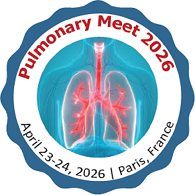Pulmonary Hypertension
Pulmonary hypertension is elevated blood pressure in the pulmonary arteries, leading to strain on the heart and impaired oxygenation. In 2026, research focuses on novel vasodilators, targeted therapies for PAH, improved imaging, and early detection strategies. Associated conditions include autoimmune disorders, congenital heart disease, and pulmonary embolism.
Related Conference of Pulmonary Hypertension
April 27-28, 2026
14th International Conference on COPD Clinical Trials & Lung Care Advances
Paris, Aland Islands
May 14-15, 2026
6th International Conference on Tuberculosis, Lung Health and Respiratory Diseases
Paris, France
June 29-30, 2026
16th International Conference on Pulmonary & Respiratory Medicine
Aix-en-Provence, France
November 19-20, 2026
18th International Conference on Chronic Obstructive Pulmonary Disease
Dubai, UAE
Pulmonary Hypertension Conference Speakers
Recommended Sessions
- Pulmonology
- Sleep-Related Respiratory Disorders
- Asthma
- Chronic Bronchitis
- Chronic Obstructive Pulmonary Disease (COPD)
- Cystic Fibrosis
- Infectious Respiratory Diseases
- Interstitial Lung Disease (ILD)
- Lung Cancer
- Lung Problems
- Lung Transplantation
- Pleural Diseases
- Prevention and Control of Respiratory Diseases
- Pulmonary Hypertension
- Pulmonary Rehabilitation
- Respiratory Disorders
- Respiratory Tract Infections
- Tuberculosis
Related Journals
Are you interested in
- Advances in Mechanical Ventilation and Respiratory Support - Pulmonology-2026 (Spain)
- Airway Management Techniques in Critical Care Settings - Pulmonology-2026 (Spain)
- Asthma - Pulmonary Meet 2026 (France)
- Asthma Management: Guidelines and Personalized Therapy - Pulmonology-2026 (Spain)
- Cardiopulmonary Disease - Tuberculosis-2026 (France)
- Chronic Bronchitis - Pulmonary Meet 2026 (France)
- Chronic Obstructive Pulmonary Disease (COPD) - Pulmonary Meet 2026 (France)
- Chronic Obstructive Pulmonary Disease (COPD) - Tuberculosis-2026 (France)
- Chronic Obstructive Pulmonary Disease (COPD) Updates - Pulmonology-2026 (Spain)
- Climate Change and Respiratory Diseases - Tuberculosis-2026 (France)
- Critical Care Strategies in Sepsis and Multi-Organ Failure - Pulmonology-2026 (Spain)
- Cystic Fibrosis - Pulmonary Meet 2026 (France)
- Drug-Resistant Tuberculosis: - Tuberculosis-2026 (France)
- Early Detection and Diagnosis - Tuberculosis-2026 (France)
- Epidemiology of TB Disease - Tuberculosis-2026 (France)
- Ethical Dilemmas and Decision-Making in ICU Settings - Pulmonology-2026 (Spain)
- Gastroesophageal reflux disease (GERD) - Tuberculosis-2026 (France)
- Immunotherapy and Biologics in Respiratory Diseases - Pulmonology-2026 (Spain)
- Infection Control Measures - Tuberculosis-2026 (France)
- Infectious Respiratory Diseases - Pulmonary Meet 2026 (France)
- Innovations in Interventional Pulmonology - Pulmonology-2026 (Spain)
- Integrated Healthcare Approach - Tuberculosis-2026 (France)
- Interstitial Lung Disease (ILD) - Pulmonary Meet 2026 (France)
- Latent TB Infection and Active TB Disease - Tuberculosis-2026 (France)
- Lung Cancer - Pulmonary Meet 2026 (France)
- Lung Cancer Screening, Diagnosis, and Interventions - Pulmonology-2026 (Spain)
- Lung Cancer: Screening, Diagnosis & Treatment - Tuberculosis-2026 (France)
- Lung Function in Men with and without HIV - Tuberculosis-2026 (France)
- Lung Infection - Tuberculosis-2026 (France)
- Lung Infections: Tuberculosis, Pneumonia, and Beyond - Pulmonology-2026 (Spain)
- Lung Problems - Pulmonary Meet 2026 (France)
- Lung Transplantation - Pulmonary Meet 2026 (France)
- Management of Acute Respiratory Distress Syndrome (ARDS) - Pulmonology-2026 (Spain)
- Multidrug-resistant TB - Tuberculosis-2026 (France)
- Mycobacterial Infections - Tuberculosis-2026 (France)
- Non-Invasive Ventilation in Acute and Chronic Care - Pulmonology-2026 (Spain)
- Nutrition and Tuberculosis - Tuberculosis-2026 (France)
- One Health Approach to TB Control - Tuberculosis-2026 (France)
- Palliative Care for Advanced Lung Cancer - Tuberculosis-2026 (France)
- Pediatric Pulmonology and Critical Care Challenges - Pulmonology-2026 (Spain)
- Pediatric Tuberculosis - Tuberculosis-2026 (France)
- Pleural Diseases - Pulmonary Meet 2026 (France)
- Point-of-Care Ultrasound in Critical Care Medicine - Pulmonology-2026 (Spain)
- Post-COVID Pulmonary Complications and Long-Term Care - Pulmonology-2026 (Spain)
- Prevention and Control of Respiratory Diseases - Pulmonary Meet 2026 (France)
- Preventive Therapy - Tuberculosis-2026 (France)
- Pulmonary Complications of Endocrine Diseases - Tuberculosis-2026 (France)
- Pulmonary Diseases and Therapeutics - Tuberculosis-2026 (France)
- Pulmonary Edema - Tuberculosis-2026 (France)
- Pulmonary Fibrosis and Interstitial Lung Disease - Pulmonology-2026 (Spain)
- Pulmonary Hypertension - Pulmonary Meet 2026 (France)
- Pulmonary Hypertension: Diagnosis and Emerging Therapies - Pulmonology-2026 (Spain)
- Pulmonary Rehabilitation - Pulmonary Meet 2026 (France)
- Pulmonary Rehabilitation and Patient-Centered Recovery - Pulmonology-2026 (Spain)
- Pulmonology - Pulmonary Meet 2026 (France)
- Research and Innovation - Tuberculosis-2026 (France)
- Respiratory Disorders - Pulmonary Meet 2026 (France)
- Respiratory Tract Infections - Pulmonary Meet 2026 (France)
- Role of Imaging in Pulmonary Diagnostics and ICU Care - Pulmonology-2026 (Spain)
- Sleep-Disordered Breathing and CPAP Therapies - Pulmonology-2026 (Spain)
- Sleep-Related Respiratory Disorders - Pulmonary Meet 2026 (France)
- TB Clinical Trials - Tuberculosis-2026 (France)
- TB Vaccines - Tuberculosis-2026 (France)
- TB-HIV Co-Infection: - Tuberculosis-2026 (France)
- TB-HIV Co-infections - Tuberculosis-2026 (France)
- Tuberculosis - Pulmonary Meet 2026 (France)
- Tuberculosis in Vulnerable Populations - Tuberculosis-2026 (France)
- Vaccination Programs: - Tuberculosis-2026 (France)

